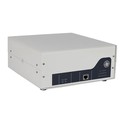Hey there! As a supplier of ultrasonic pipe filters, I often get asked about the anti-corrosion mechanism of these nifty devices. So, let's dive right in and explore how our Ultrasonic Pipe Filter keeps corrosion at bay.
First off, let's understand what corrosion is. In simple terms, corrosion is the gradual destruction of materials, usually metals, by chemical reactions with their environment. This can be a real headache in many industries, especially those dealing with liquids flowing through pipes. Corroded pipes can lead to leaks, reduced efficiency, and even pose safety risks. That's where our Ultrasonic Pipe Filter comes in.
One of the key components in the anti-corrosion mechanism of our Ultrasonic Pipe Filter is the use of high-quality materials. We use corrosion-resistant alloys and polymers in the construction of the filter. These materials are carefully selected for their ability to withstand the harsh chemicals and conditions often found in industrial pipes. For example, some of the alloys we use have a high chromium content, which forms a thin, protective oxide layer on the surface. This layer acts as a barrier, preventing further corrosion from occurring.
But it's not just about the materials. The ultrasonic technology itself plays a crucial role in preventing corrosion. Ultrasonic waves create high-frequency vibrations in the liquid flowing through the pipe. These vibrations have several effects that help in the anti-corrosion process.
One of the main effects is cavitation. Cavitation is the formation and collapse of tiny bubbles in the liquid. When the ultrasonic waves pass through the liquid, they cause the pressure to fluctuate rapidly. This rapid pressure change leads to the formation of bubbles. When these bubbles collapse, they generate a tremendous amount of energy in the form of shockwaves. These shockwaves can dislodge any corrosion products or deposits that may have started to form on the pipe walls. By removing these deposits, the ultrasonic waves prevent the build-up of corrosive substances, which can accelerate the corrosion process.
Another important aspect is the agitation of the liquid. The ultrasonic vibrations keep the liquid in constant motion. This agitation helps to distribute any anti-corrosion additives evenly throughout the liquid. Anti-corrosion additives are chemicals that are added to the liquid to inhibit corrosion. By ensuring that these additives are well-distributed, the ultrasonic waves enhance their effectiveness in protecting the pipe walls.
In addition to cavitation and agitation, the ultrasonic waves also have a cleaning effect on the pipe surface. They can remove any dirt, debris, or biofilms that may be present on the pipe walls. These contaminants can create a favorable environment for corrosion to occur. By keeping the pipe surface clean, the ultrasonic waves reduce the risk of corrosion.
Now, let's talk about how our Ultrasonic Pipe Filter compares to other types of filters, such as the Ultrasonic Tank Filter. While both filters use ultrasonic technology, they are designed for different applications. The Ultrasonic Tank Filter is typically used in tanks to clean and filter the liquid stored in them. On the other hand, our Ultrasonic Pipe Filter is specifically designed for use in pipes. It can be easily installed in existing pipe systems without the need for major modifications.
The anti-corrosion mechanism of the Ultrasonic Pipe Filter is also more focused on protecting the pipe walls. Since the liquid is flowing through the pipe, the ultrasonic waves can continuously act on the pipe surface, providing ongoing protection against corrosion. In contrast, the Ultrasonic Tank Filter is more concerned with cleaning the liquid in the tank.
So, if you're looking for a reliable solution to prevent corrosion in your pipes, our Ultrasonic Pipe Filter is the way to go. It offers a cost-effective and efficient way to protect your pipes and ensure the smooth operation of your industrial processes.
But don't just take my word for it. Many of our customers have seen significant improvements in the lifespan of their pipes after installing our Ultrasonic Pipe Filter. They have reported reduced maintenance costs, fewer leaks, and improved overall efficiency.
If you're interested in learning more about our Ultrasonic Pipe Filter or discussing your specific requirements, we'd love to hear from you. Whether you're in the chemical industry, food and beverage industry, or any other industry that uses pipes, our filter can provide the protection you need.


Contact us today to start a conversation about how our Ultrasonic Pipe Filter can benefit your business. We're here to help you find the best solution for your anti-corrosion needs.
References
- "Ultrasonic Technology in Industrial Filtration", Journal of Industrial Filtration
- "Corrosion Prevention in Pipes: A Comprehensive Guide", Corrosion Science Review





